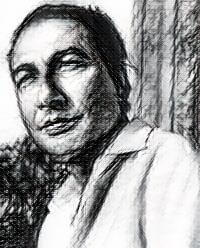Here’s a critical analysis of Saadat Hasan Manto’s three short stories, Toba Tek Singh, A Girl from Delhi and A Tale of 1947, by Basudeb, to understand the crisis of Muslim identity by the renowned writer, in the weekly column, exclusively for Different Truths.
Saadat Hasan Manto, a writer of about 250 short stories in Urdu was born in Punjab, on May 11, 1912. After the Independence of India, in 1947, Saadat Hasan Manto opted for Pakistan and some time, in 1953, he left for Pakistan and died, in 1955, at Lahore. The stories of Manto evidently record the haziness of the Hindu-Muslim relationship during the time of Indian partition. Manto’s stories on partition show how Hindus and Muslims are involved in violence and brutal attack on each other during the time of the partition. His stories are the stories of man’s menacing madness, bestiality and savagery which, according to him, may be the metaphor of the Indian partition and at the same time of the assertion of some basic goodness of some individuals belong to both Hindu and Muslim community.
A close reading of Manto’s short stories reveals that Manto does not support Jinnah’s two-nation theory. He does not think that the Muslim nationalism is relevant to the context of the Indian Independence, in 1947. His concept of handiness is the integration of both Muslims and Hindus living together peacefully for centuries. He abhors the Hindu-Muslim riot, the raping and abduction of the woman, the looting and burning of properties, and the colossal loss of human lives. Nevertheless, at the same time, he is not blind to the crisis of Muslim identity in India. To him, this crisis is the reality. Soon after the Indian Independence, in 1947, he migrates to Pakistan perhaps with a hope that he may find out a land of his own. Manto is controversial at least in this point. Why does he opt for Pakistan? Why does he leave his birthplace, at Samrala, in the Ludhiana district of Punjab? For professional compulsions, he has to go to Bombay. Had he not supported the Muslim nationalism, he would not leave for Pakistan. He decides to settle in Pakistan permanently, perhaps because he understands that Pakistan, a separate land for Muslims in India, is an inevitable reality. I examine some of his stories on the partition theme here that underscore this point. Those stories show that the partition of India is a partition of one heart into two. The partition of India is a split of one identity into two on the basis of the polarisation of two religions. The contradiction in Manto’s attitude to the Muslim nationalism that grows in India is conspicuous in his writings. The contradiction lies in Manto’s delineation of the crisis of identity in his short stories as well as his innermost realisation emphasising that the partition is unnecessary and it accompanies untold sufferings of both Hindus and Muslims in India. He addresses the partition violence as ‘an act of collective madness’.
Indeed Manto is a crusader against man’s dishonesty, falsehood, and hypocrisy. His scathing attack on man’s meanness is evident in his stories on partition theme. Stephen Alter observes:
Leslie Flemming, Manto’s American biographer, refers to him as a ‘Kind-hearted Terrorist’….
To Manto, the crisis of Muslim identity is a harsh reality but at the same time, he believes that the partition of India accompanying an orgy of violence and bestiality in the name of religious identity or in the name of the Muslim nationalism is suicidal and hence detestable. My purpose is to show that Manto, while underlining the crisis of Muslim identity exposes the utter meaninglessness of the barbarity, falsehood, and hypocrisy of those people, involved in partition violence in the name of religion. And to do this, I intend to examine these three short stories: Toba Tek Singh, A Girl from Delhi and A Tale of 1947. The selection of these three short stories from Mottled Dawn Fifty Sketches and Stories of Partition, translated into English from the original in Urdu by Khalid Hasan is arbitrary and random.
Manto’s Toba Tek Singh is a story that presents the ‘madness’ as a suitable metaphor of the orgy of the partition violence. This story poignantly emphasises that the partition of India into Pakistan and Hindustan is equal to an attempt to divide a man’s one heart into two. The western concept of nation state is alien to Saadat Hasan Manto and for that reason, Manto can make such a comment:
But now that piece of land, which I had once known as India, now has a new name. Had this changed anything? I didn’t know? 2 (p.91, The Literary Criterion)
After the partition in 1947, the government of India and of Pakistan decides to exchange the lunatics confined to Indian and Pakistani jails. The religion will be the basis of the exchange. Muslim lunatics from the Indian jails will be sent to Pakistan and Hindu and Sikh lunatics from Pakistani jail to India. In a prison house at Lahore, preparations for this exchange are on. The idea behind this exchange is that Muslims are for Pakistan and Hindus for India. Manto’s comment on this exchange of lunatics based on religion is interesting:
As to where Pakistan was located, the inmates knew nothing. That was why both the mad and the partially mad were unable to decide whether they were now in India or in Pakistan. If they were in India, where on earth was Pakistan? And if they were in Pakistan, then how come that until only the other day it was India?
One inmate had got so badly caught up in this India-Pakistan-Pakistan-India rigmarole that one day, while sweeping the floor, he dropped everything, climbed the nearest tree and placed himself on a branch, from which vantage point he spoke for two hours on the delicate problem of India and Pakistan. The guards asked him to get down; instead, he went a branch higher, and when threatened with punishment, he declared:
‘I wish to live neither in India nor in Pakistan. I wish to live in this tree’. (Manto, p.3)
The irony of the crisis of identity is that the lunatics are not even spared. This is what Manto precisely means inToba Tek Singh. There is one Sikh inmate; he is Bishan Singh who hails from Toba Tek Singh. He does not know whether Toba Tek Singh is in Pakistan or in India. Nobody in the jail knows the present status of this place after the partition of India. Fazal Din, a Muslim friend of Bishan Singh comes from Toba Tek Singh and he wants him to go to India where his friends and relatives are.
Everything for the exchange of lunatics of Lahore jail is complete. The inmates are brought to the Pakistan-India border. Bishan Singh is also brought to the border. One of the Pakistani guards pushes Bishan Singh ‘across the dividing line towards India’. However, Bishan Singh decides not to move an inch. Manto concludes the story thus:
Many efforts were made to explain to him that Toba Tek Singh had already been moved to India, or would be moved immediately, but it had no effect on Bishan Singh. The guards even tried force, but soon gave up.
There he stood in no man’s land on his swollen legs like a colossus….He was allowed to stand where he wanted, while the exchange continued. The night wore on.
Just before the sunrise, Bishan Singh, the man who had stood on his legs for fifteen years, screamed and as officials from the two sides rushed towards him, he collapsed to the ground.
There, behind barbed wire, on one side, lay India and behind more barbed wire, on the other side, lay Pakistan. In between, on a bit of earth, which had no name, lay Toba Tek Singh. (Manto, pp10-11)
The conclusion of this story is very much distressing. The irony is that the saner people, the engineers of the Indian partition, in 1947, divide India into two parts but the half sane Bishan Singh does not make out what actually this partition means. The way and the place where Bishan Singh dies are symbolic. One part of his body lies in India and another part in Pakistan. He does not accept the partition of his country. The death of Bishan Singh is a revolt against the artificial division of India. Bishan Singh, a lunatic prisoner, dies on the borderline of India and Pakistan. In Toba Tek Singh, Manto perhaps pinpoints that the identity of Muslims and of Hindus are reality but in no way, the identity of Hindus and of Muslims do clash with each other in such a violent form that results in the partition of one nation.
In A Girl from Delhi, Manto shows how the crisis of Muslim identity leads one Delhi-based dancing girl to leave for Pakistan when insecurity threatens the Muslim community in Delhi immediately after the Indian partition. Nasim Akhtar, a singing and dancing girl who lives with her mother in the red light area of Old Delhi is very much scared of the continuing riots in Delhi. Nasim repeatedly asks her mother to leave Delhi but her old mother tries to appease her daughter saying that there is no place for them to go. A piece of conversation between Nasim and her old mother reveals how Nasim suffers the crisis of her Muslim identity:
The old woman carefully placed a betel leaf in her toothless mouth and asked, ‘But where will we go, sweetheart?’
‘Pakistan,’ Nasim Akhtar replied and looked at her music teacher, old Ustad Achhan Khan. ‘Khan sahib, what do you think? Is it any longer safe for us Muslims to live in Delhi?’ … ‘It is going to be Hindu Raj; they don’t want any Muslims around’.
‘So what,’ her mother replied, ‘we are in business because of our Hindu patrons and clients. All your admirers and regulars are Hindus, and don’t you forget that . . . .
‘Don’t say that mother,’ Nasim Akhtar reacted sharply, ‘Quaidi-I-Azam, Jinnah sahib, has worked so hard and got us our own country, Pakistan, and that’s where we should go and live.’ (Manto, pp.121-22)
The old woman is aware of the difference between Hindus and Muslims as far as her Muslim identity is concerned. She is very conscious of the communal riots continuing in the city but at the same time, she is well sentient of the fact that under no circumstances her physical security will be endangered because of the business ties with Hindus. She tells her daughter that they are in business because of their Hindu patrons and clients. From this piece of conversation between the old woman and her daughter, it is clear that the old woman is very much conscious of her Muslim identity; simultaneously, it is also obvious that her Muslim identity is not in any crisis. Therefore, she does not want to leave for Pakistan.
However, Nasim Akhtar’s perception of the relationship between Hindus and Muslims is different from that of her mother. She believes that Jinnah has wrestled hard with the Congress leadership and the British rulers to have a separate land for Musalmans in India. They have won Pakistan. Pakistan is for the Musalmans, and all Muslims should live in their homeland. Nasim is then mentally prepared to leave for Pakistan and she starts preparation for moving. A sudden turn of events makes her determined to immediately leave for Pakistan. One of their servants informs her that he has seen five Sikhs stabbing a Muslim street hawker near their house. It upsets and disorients her totally. The old woman already requests one of their clients, Seth Gobind Prakash to make certain security arrangements for them. Three men sent by Seth Gobind Prakash come towards the Kotha. Nasim totally breaks down at it and goes to the rooftop. Later, Ustad Achhan Khan tells her the following:
‘Just what I had feared. The three men came up as soon as you had left the room. They said that they had been sent by Seth Gobind Prakash to fetch you to his residence since he couldn’t make it himself. Your mother was pleased and said it was very kind of him. She thought you were in the bathroom. She told the men she would have to come along too, but one of them said, ‘We don’t want you, you old hag. We have come for the young one.’ When I heard that, I slipped out and rushed here to warn you,’ the old man said breathlessly. (Manto, p.127)
Seth Gobind Prakash’s purpose is not good. His men come to the Kotha and one of them asks only for Nasim. Those three men are not at all interested in the old woman. They have come only to take care of her young daughter, Nasim. The event deepens Nasim’s worsening crisis of Muslim identity. She believes that Muslims are not safe in Hindu India. Ustad Achhan Khan and Nasim then escape and reach Lahore. In Lahore, Nasim declines to lead a life at Hira Mandi, the city’s red light area though Ustad Achhan Khan repeatedly tries to convince her of the uselessness of her decision. She wants to marry a gentleman and to lead a normal family life. Ustad Achhan Khan arranges a small house for her in a decent locality and he moves to Hira Mandi where he feels comfortable. One old woman called Jannatey regularly visits her. Nasim is happy with her company. However, Jannatey’s identity as a person who collects young women and sells them into prostitution remains unknown to Nasim. One day Jannatey hears Nasim singing a melodious song. Immediately she decides to sell her off for prostitution. She informs Nasim of a person who is honest and is ready to marry her. A date is fixed and Nasim is married to that person. However, Nasim’s happiness does not last even twenty-four hours. Next day, she hears her husband bargaining with two persons of Lahore Hira Mandi over her price. The man simply sells her off and Jannatey plays the role of a middle person. Nasim cries bitterly for some time and then moves straightway to Hira Mandi where Ustad Achhan Khan lives.
Sadaat Hasan Manto is a short story writer who envisions multi-facets of human life with compassion and human understanding. The later part of the story has nothing to do with Nasim’s crisis of Muslim identity. Nasim’s crisis of Muslim identity has been dealt only at the beginning of the story. A bad person has no religion. He may be a Hindu or a Muslim. Nasim being driven by her crisis of Muslim identity leaves India and comes to Pakistan, which, according to her conviction, is a homeland for Muslims. And in Pakistan she becomes the victim of a Muslim procuress of the young woman for Lahore Hira Mandi.
Manto’s story, A Tale of 1947, is a faithful record of how a free and broadminded Mumtaz can suffer the crisis of Muslim identity during the partition violence, in 1947. Mumtaz is a person who believes that no religion can be wiped out by any gun. To him, the massacre of hundred thousands of Muslims and Hindus is absolutely meaningless. By killing Muslims, Islam cannot be liquidated. The killing of Hindus will hardly affect the Hindu religion.
The story begins with Mumtaz sailing for Pakistan from Bombay seaport. Three of his Hindu friends come to see him off. Jugal is one of Mumtaz Hindu friends. Before his decision to leave for Pakistan, one-day Jugal receives a letter, which informs him that his uncle is killed by Muslims in Lahore when the partition violence breaks in there. Jugal also adds:
‘If Hindu-Muslim killings start here, I don’t know what I’ll do’.
‘What’ll you do?’ Mumtaz had asked.
‘I don’t know. Maybe I’ll kill you’, he had replied darkly. (Manto, p.158)
Jugal and Mumtaz are good friends. Religion never stands as a bar in their friendship. However, Jugal’s conscious or unconscious expression of bitterness in the line of religion perhaps stuns Mumtaz and he becomes dumb-found. For the next eight days, he speaks nothing to anybody. Jugal’s attitude to Muslims perhaps makes Mumtaz feel for the first time that he is a Muslim first and then a friend of Jugal. This makes him aware of the crisis of his Muslim identity. This shocking revelation leads him to leave for Pakistan. He starts feeling that Hindu-dominated India is no longer his own land.
The crisis of identity characterises the partition fiction in English and in English translation in different forms. In some of the fictions, it is discernable that the crisis of Muslim identity plays an important role in the making of the organised violence during the time of the Indian partition, in 1947, where the Hindu population outnumbers the Muslim minority. In some fictions like Bapsi Sidhwa’s Ice-Candy Man the crisis of Hindu identity becomes the cardinal vision of the fictional writers. The demographic character of the place is that the Muslim population dominates the locale. Hindus are a minority there. In some fictions like Chaman Nahal’s Azadi, the crisis of both Hindu and Muslim identity are foregrounded as fictional reality.
Works Cited
Primary Source: Sadaat Hasan Manto, Mottled Dawn. Fifty Sketches and Stories of Partition. Translated by Khalid Hasan, New : Delhi: Penguin Books,2002.
1) Stephen Alter,”Madness and Partition: The Short Stories of Saadat Hasan Manto”, Journal of Comparative Poetics, No 14, 1994. p.93.
(The Department of English and Comparative Literature, American University in Cairo and American University in Cairo Press currently publish Journal of Comparative Poetics.
2) Quoted from Shreya Bhattacharji, “The Relevance of Saadat Hasan Manto Today”, The Literary Criterion, ed. C.D. Narasimhaiah, Special Number on Asian Literature -2Vol.XXXVIII, No.3 & 4, 2003.
©Basudeb Chakraborti
Photos from the internet.
#MakingOfLiterature #SaadatHasanManto #TobaTekSingh #AGirlfromDelhi #ATaleof1947 #HinduMuslim #DifferentTruths






 By
By
 By
By
